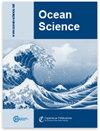海洋热浪的可预测性:基于 ECMWF 季节预报系统的评估
IF 4.1
3区 地球科学
Q2 METEOROLOGY & ATMOSPHERIC SCIENCES
引用次数: 0
摘要
摘要。海洋热浪(MHWs)被定义为海面温度(SST)极高的长时间,在过去十年中,随着气候变暖,海洋热浪的频率和强度都在增加,因此受到了广泛关注。本文研究了欧洲中期天气预报中心(ECMWF)的季节性业务预报系统在多大程度上可以预测 MHW 的季节性出现和持续时间。从季节性 SST 预报中得出了对 MHW 事件发生率、每季 MHW 日数及其强度和空间范围的预测,并使用 1982-2021 年期间的确定性和概率指标,对照基于观测的 SST 分析进行了评估。预测得分显示,在预测起始日期之后两个季节全球出现的 MHWs 方面,预测技能非常有用。厄尔尼诺地区、加勒比海、大热带地区、热带外太平洋东北部和热带外盆地西南部的预测能力最强。其他中纬度东部盆地和地中海的预报技能则较差,预报系统能够代表马赫沃斯的低频调制,但在预测马赫沃斯特征的年际变化方面技能较差。线性趋势分析表明,在全球范围内,MHW 发生率在上升,预报很好地捕捉到了这一趋势。本文章由计算机程序翻译,如有差异,请以英文原文为准。
Predictability of marine heatwaves: assessment based on the ECMWF seasonal forecast system
Abstract. Marine heatwaves (MHWs), defined as prolonged period of extremely warm sea surface temperature (SST), have been receiving a lot of attention in the past decade as their frequency and intensity increase in a warming climate. This paper investigates the extent to which the seasonal occurrence and duration of MHWs can be predicted with the European Centre for Medium-Range Weather Forecast (ECMWF) operational seasonal forecast system. The prediction of the occurrence of MHW events, the number of MHW days per season, and their intensity and spatial extent are derived from seasonal SST forecasts and evaluated against an observation-based SST analysis using both deterministic and probabilistic metrics over the 1982–2021 period. Forecast scores show useful skill in predicting the occurrence of MHWs globally for the two seasons following the starting date. The skill is the highest in the El Niño region, the Caribbean, the wider tropics, the north-eastern extra-tropical Pacific, and southwest of the extra-tropical basins. The skill is not as good for other midlatitude eastern basins nor for the Mediterranean, with the forecast system being able to represent the low-frequency modulation of MHWs but showing poor skill in predicting the interannual variability of the MHW characteristics. Linear trend analysis shows an increase in MHW occurrence at a global scale, which the forecasts capture well.
求助全文
通过发布文献求助,成功后即可免费获取论文全文。
去求助
来源期刊

Ocean Science
地学-海洋学
CiteScore
5.90
自引率
6.20%
发文量
78
审稿时长
6-12 weeks
期刊介绍:
Ocean Science (OS) is a not-for-profit international open-access scientific journal dedicated to the publication and discussion of research articles, short communications, and review papers on all aspects of ocean science: experimental, theoretical, and laboratory. The primary objective is to publish a very high-quality scientific journal with free Internet-based access for researchers and other interested people throughout the world.
Electronic submission of articles is used to keep publication costs to a minimum. The costs will be covered by a moderate per-page charge paid by the authors. The peer-review process also makes use of the Internet. It includes an 8-week online discussion period with the original submitted manuscript and all comments. If accepted, the final revised paper will be published online.
Ocean Science covers the following fields: ocean physics (i.e. ocean structure, circulation, tides, and internal waves); ocean chemistry; biological oceanography; air–sea interactions; ocean models – physical, chemical, biological, and biochemical; coastal and shelf edge processes; paleooceanography.
 求助内容:
求助内容: 应助结果提醒方式:
应助结果提醒方式:


